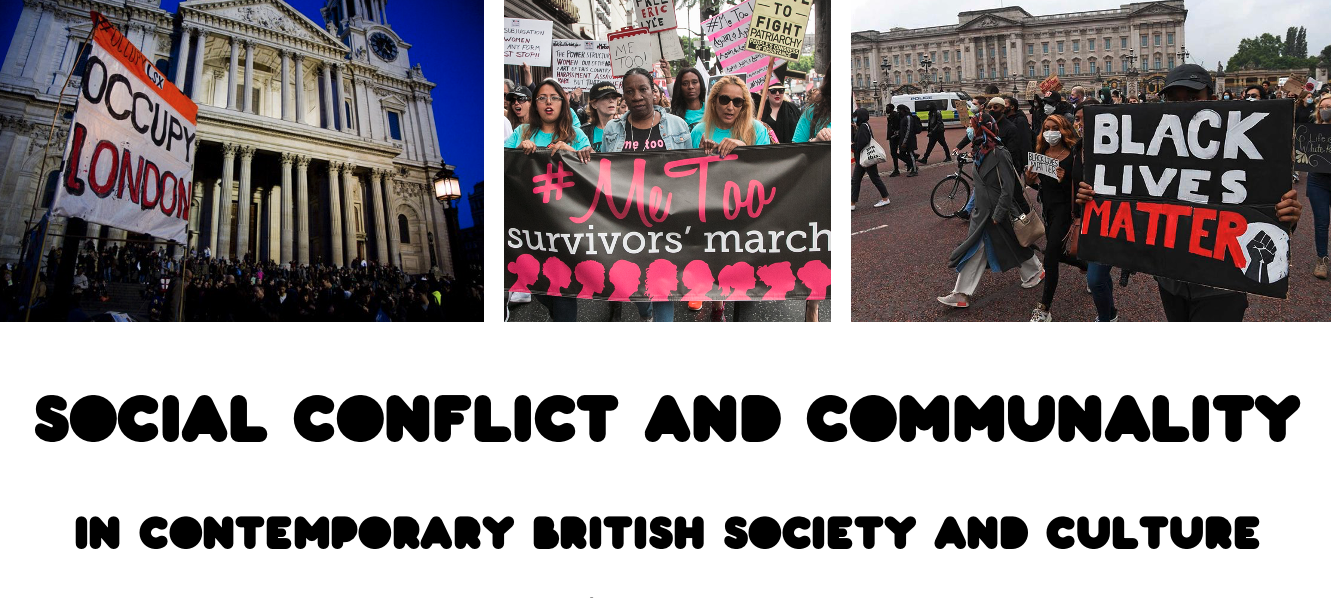
M1 / Semestre 7 – Bloc 1 (Majeure) – B. Enjeux et pratiques disciplinaires
UE2 : Enjeux contemporains (Cultural Studies) - Cours de D. Haigron
Social conflict and communality: Class, gender, and race in contemporary British society and culture
British society is built on structural divisions based (mostly but not entirely) on class, gender and race, and its construction is driven by conflicts between categories of the population defending their respective interests in power relations, usually with an opposition between discriminated minorities and an hegemonic group. These conflicts have contributed to fostering communitarian identities and histories (Orgreave, Dagenham, #MeToo, Black Lives Matter, etc.), but have also found their place in collective national memory. This course will analyse social conflicts from a sociological and cultural perspective. The aim is to assess how they gained mythological status as defining landmarks, and how they participated in shaping British society. This will finally raise the question as to whether social conflict also —somehow paradoxically— helped build togetherness and communality, within or between the various sections of society.
Selected bibliography
BANYARD, Kat. The Equality Illusion: The Truth about Women and Men Today. Faber & Faber, 2010.
CANNADINE, David. The Undivided Past: Humanity Beyond our Differences. Alfred A. Knopf, 2013.
GILROY, Paul. There Ain’t No Black in the Union Jack: The Cultural Politics of Race and Nation. Routledge (1987), 2010.
HALL, Stuart, et al., eds. Representation. Sage & Open University, 2013.
JONES, Owen. Chavs: The Demonization of the Working Class. Verso, 2016.
PANAYI, Panikos. An Immigration History of Britain: Multicultural Racism since 1800. Longman, 2010.
SKEGGS, Beverley. Formations of Class and Gender: Becoming Respectable. Sage, 1997.
UE2 : Enjeux contemporains (Cultural Studies) - Cours de D. Haigron
Social conflict and communality: Class, gender, and race in contemporary British society and culture
British society is built on structural divisions based (mostly but not entirely) on class, gender and race, and its construction is driven by conflicts between categories of the population defending their respective interests in power relations, usually with an opposition between discriminated minorities and an hegemonic group. These conflicts have contributed to fostering communitarian identities and histories (Orgreave, Dagenham, #MeToo, Black Lives Matter, etc.), but have also found their place in collective national memory. This course will analyse social conflicts from a sociological and cultural perspective. The aim is to assess how they gained mythological status as defining landmarks, and how they participated in shaping British society. This will finally raise the question as to whether social conflict also —somehow paradoxically— helped build togetherness and communality, within or between the various sections of society.
Selected bibliography
BANYARD, Kat. The Equality Illusion: The Truth about Women and Men Today. Faber & Faber, 2010.
CANNADINE, David. The Undivided Past: Humanity Beyond our Differences. Alfred A. Knopf, 2013.
GILROY, Paul. There Ain’t No Black in the Union Jack: The Cultural Politics of Race and Nation. Routledge (1987), 2010.
HALL, Stuart, et al., eds. Representation. Sage & Open University, 2013.
JONES, Owen. Chavs: The Demonization of the Working Class. Verso, 2016.
PANAYI, Panikos. An Immigration History of Britain: Multicultural Racism since 1800. Longman, 2010.
SKEGGS, Beverley. Formations of Class and Gender: Becoming Respectable. Sage, 1997.
- Enseignant: David Haigron